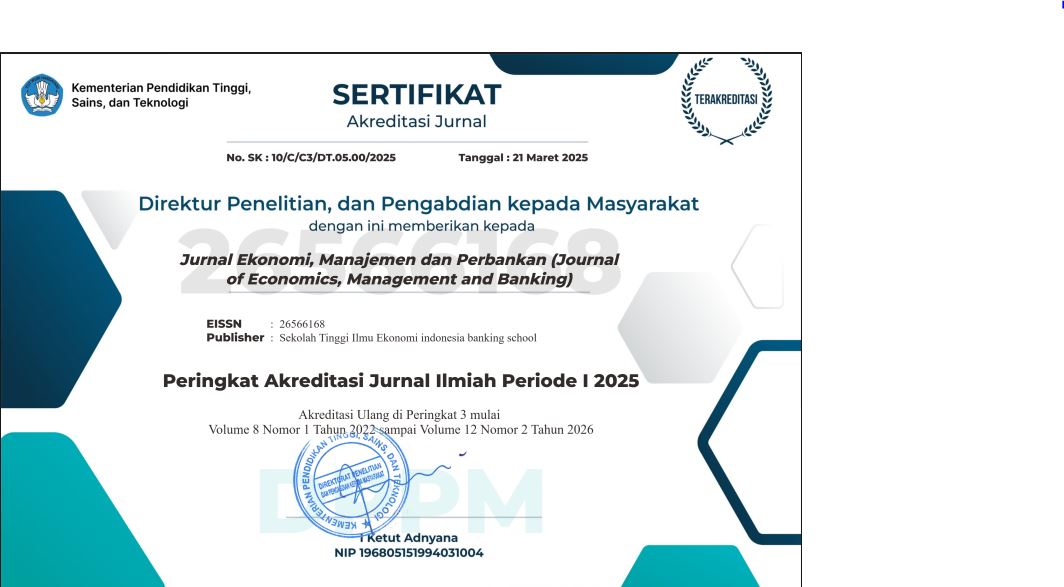Pengaruh Perceived Value Tiktok Live melalui Customer Engagement pada Gen-Z di Jabodetabek
DOI:
https://doi.org/10.35384/jemp.v11i1.710Keywords:
perceived Value, customer trust, customer engagement, generasi Z, tiktok liveAbstract
Penelitian ini bertujuan untuk menganalisis Pengaruh Perceived Value terhadap Customer Engagement TikTok Live pada generasi Z di Jabodetabek. Perceived value yang terdiri dari utilitarian value, hedonic value, dan symbolic value memiliki peran penting dalam membangun kepercayaan konsumen (customer trust) terhadap penjual dan produk yang ditawarkan. Studi ini menggunakan metode kuantitatif dengan pengumpulan data melalui kuesioner yang disebarkan kepada 50 responden yang merupakan pengguna TikTok Live berusia 17-27 tahun. Hasil penelitian menunjukkan bahwa utilitarian value memiliki pengaruh positif terhadap trust in product, symbolic value memiliki pengaruh positif terhadap trust in seller dan hedonic value memiliki pengaruh positif terhadap customer engagement. Temuan ini memberikan wawasan bagi pelaku bisnis dan industri media sosial mengenai pentingnya membangun keterlibatan konsumen dan kepercayaan melalui platform TikTok Live, serta dapat menjadi acuan dalam meningkatkan strategi pemasaran yang lebih efektif di kalangan generasi Z.
References
Al Doghan, M., & Albarq, A. N. (2022). The effects of hedonic and utilitarian values on e-loyalty: Understanding the mediating role of e-satisfaction. International Journal of Data and Network Science, 6(2), 325–334. https://doi.org/10.5267/j.ijdns.2022.1.005
Badan Pusat Statistik. (2020). Lonjakan Perdagangan pada E-commerce. Lonjakan Perdagangan Pada E-Commerce. https://sensus.bps.go.id/topik/tabular/sp2020/2/0/0
Bianchi, C., & Andrews, L. (2018). Consumer engagement with retail firms through social media: an empirical study in Chile. International Journal of Retail and Distribution Management, 46(4), 364–385. https://doi.org/10.1108/IJRDM-02-2017-0035
Cheng, X., Gu, Y., & Shen, J. (2019). An integrated view of particularized trust in social commerce: An empirical investigation. International Journal of Information Management, 45 (August 2018), 1–12. https://doi.org/10.1016/j.ijinfomgt.2018.10.014
Falahat, M., Lee, Y. Y., Foo, Y. C., & Chia, C. E. (2019). A model for consumer trust in E- commerce. Asian Academy of Management Journal, 24, 93–109. https://doi.org/10.21315/aamj2019.24.s2.7
Feng, Z. (2022). The Review of Online Shopping Trend During and After the Covid-19 Pandemic. Atlantis Press International BV. https://doi.org/10.2991/978-94-6463-052-7_172
Hair, J. F., Hult M., G. T., Ringle, C. M., &, & Sarstedt, M. (2017). A primer on partial least squares structural equation modeling (PLS-SEM). Sage, 390.
Harikusuma, G. D., Furkan, L. M., & Septiani, E. (2022). Pengaruh Hedonic Dan Utilitarian Motive Terhadap Brand Trust Mcdonald’S Melalui Brand Satisfaction. Distribusi - Journal of Management and Business, 10(2), 187–200. https://doi.org/10.29303/distribusi.v10i2.271
Leilani, A., Armandari, M. O., & Ambarwati, N. S. S. (2023). Hubungan Promorsi Tanggal Kembar dengan Perilaku Konsumtif Kosmetik Pengguna Marketplace. Adijaya Jurnal Multidisiplin, 1(4), 776–783. https://e-journal.naureendigition.com/index.php/mj
Lu, B., & Chen, Z. (2021). Information & Management Live streaming commerce and consumers’ purchase intention: An uncertainty reduction perspective. Information & Management, 58(7), 103509. https://doi.org/10.1016/j.im.2021.103509
Nurhanah, D., Budianto, A., & Toto. (2019). Pengaruh Customer Trust dan Customer Perceived terhadap Loyalitas Pelanggan (Suatu Studi pada Toko Rabbani Tasikmalaya). Business Managament and Entrepreneurship Journal, 1(2), 189–200.
Parameswara, B. G., Liyah, L. N., Sania, N., & Ibrahim, A. (2021). Pemanfaatan Aplikasi TIK-TOK di Masa Pandemi Covid-19. Cebong Journal, 1(1), 10–14. https://doi.org/10.35335/cebong.v1i1.4
Rimadias, S., & Rachmayanti, F. S. (2018). Analisis Peran Functional Benefits, Symbolic Benefits, Experiential Benefits Dan Customer Satisfaction Sebagai Pembentuk Loyalty Intention Pada Customer the Body Shop (Telaah Pada: the Body Shop di Wilayah Jakarta). Jurnal Ilmu Manajemen & Ekonomika, 8(1), 1. https://doi.org/10.35384/jime.v8i1.90
Sugiyono. (2020). Metodologi Penelitian Kuantitatif, Kualitatif dan R & D.
Susanto, D. A., & Sugiyanto, L. B. (2021). Pengaruh Trust, Service Quality, Utilitarian Value dengan Mediasi Attitude Toward Online Shopping, dan Subjective Norm terhadap Purchase Intention (Studi Empiris: Konsumen Tokopedia Domisili DKI Jakarta). Journal of Business & Applied Management, 14(2), 115. https://doi.org/10.30813/jbam.v14i2.2805
Wongkitrungrueng, A., & Assarut, N. (2020). The role of live streaming in building consumer trust and engagement with social commerce sellers. Journal of Business Research, 117(November 2017), 543–556. https://doi.org/10.1016/j.jbusres.2018.08.032
Yurindera, N. (2023). Minat Beli pada Live Shopping TikTok berdasarkan Sales Promotion dan Influencer Credibility. Jurnal Esensi Infokom: Jurnal Esensi Sistem Informasi Dan Sistem Komputer, 7(1), 85–89. https://doi.org/10.55886/infokom.v7i1.613
Zhang, M., & Shi, G. (2022). Consumers’ Impulsive Buying Behavior in Online Shopping Based on the Influence of Social Presence. Computational Intelligence and Neuroscience, 2022. https://doi.org/10.1155/2022/6794729
Zheng, R., Li, Z., & Na, S. (2022). How customer engagement in the live-streaming affects purchase intention and customer acquisition, E-tailer’s perspective. Journal of Retailing and Consumer Services, 68(April), 103015. https://doi.org/10.1016/j.jretconser.2022.103015
Zis, S. F., Effendi, N., & Roem, E. R. (2021). Perubahan Perilaku Komunikasi Generasi Milenial dan Generasi Z di Era Digital. Satwika : Kajian Ilmu Budaya Dan Perubahan Sosial, 5(1), 69–87. https://doi.org/10.22219/satwika.v5i1.15550
Downloads
Published
Issue
Section
License
Copyright (c) 2025 Meta Andriani, Najla Haniyah

This work is licensed under a Creative Commons Attribution-NonCommercial-ShareAlike 4.0 International License.
Authors who publish with this journal agree to the following terms:
- Authors retain copyright and grant the journal right of first publication with the work simultaneously licensed under a Creative Commons Attribution License that allows others to share the work to acknowledge the work's authorship and initial publication in this journal.
- Authors can enter into separate, additional contractual arrangements for the non-exclusive distribution of the journal's published version of the work (e.g., post it to an institutional repository or publish it in a book) with an acknowledgment of its initial publication in this journal.
- Authors are permitted and encouraged to post their work online (e.g., in institutional repositories or on their website) before and during submission. It can lead to productive exchanges and earlier and greater citation of published work.















